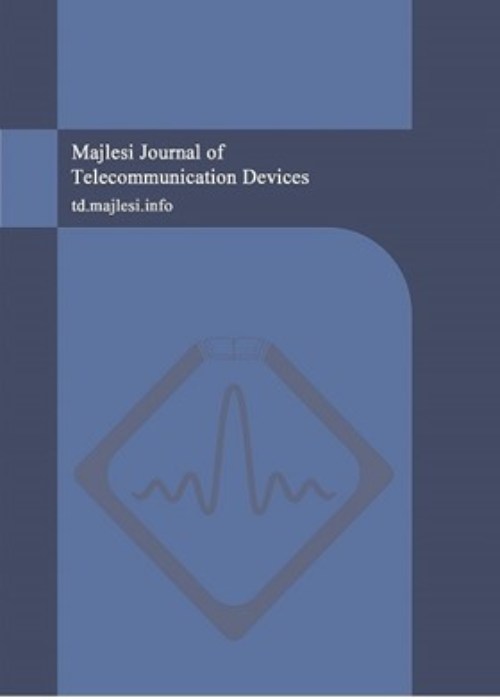فهرست مطالب
Majlesi Journal of Telecommunication Devices
Volume:10 Issue: 4, Dec 2021
- تاریخ انتشار: 1400/09/27
- تعداد عناوین: 6
-
Pages 137-145
Precise segmentation of tumors in the breast is one of the most significant steps for MRIs and diagnosis tools using computers. Segmentation of the breast tumor is a demanding task due to some factors including partial volume effect, the similarity of the brightness of tumor texture with other surrounding non-tumor textures, variety in shape size and location of the tumor in different patients. Due to its vitality, the process of segmentation is carried out manually by specialists and its disadvantages are long computation time, and high cost. To overcome these issues, algorithms are required to segment images with high accuracy and no need for user intervention. This study presents a new method based on fuzzy connectedness algorithm and super pixels for tumor segmentation in magnetic resonance imaging (MRI). The proposed method is applied to a dataset built by the respected researchers on Matlab. The suggested method has been compared using two commonly used methods of clustering and morphological operators in tumor segmentation in magnetic resonance imaging (MRI). Mean average precision of 98.33 and the Dice similarity coefficient of 98.06 signifies the prominence of the suggested method in comparison with other methods compared using clustering algorithm 90.33 and morphological algorithm 91.83.
Keywords: Tumor segmentation, Magnetic Resonance Imaging (MRI), Fuzzy connectedness, Super pixel algorithm -
Pages 147-158
Distributed computing is a field of the vast computer science that deals with distributed systems. These systems have a significant role in computing with high efficiency. One of the important cases with a great role in distributed systems is the self-stabilizing concept. One of the new algorithms with a critical role in engineering and computer science is self-stabilization algorithm. This algorithm is known as a lightweight and convenient property relative to other classic solutions and methods of fault tolerance in obtaining fault tolerance (FT). Moreover, in terms of time and space, the art of this algorithm is that it needs less time and space. These features have made the self-stabilization algorithm highly promising for use in distributed systems that are equipped with low computing and low memory processes. Wireless sensor networks (WSNs) include many sensor nodes that can receive, collect, process and transfer data. These networks are widely used in industrial, military, and civilian uses like industrial facility management, power / engine sources monitoring, target routing, care, healthcare management, and geographic information analysis, and so on. The paper, comprehensively, discussed this algorithm and its uses in wireless networks.
Keywords: Self-stabilization algorithm, FT, convergence, wireless networks, self-stabilizing time -
Pages 159-163
Digital Sigma Delta Modulator architecture is widely used in fractional frequency synthesizers. A frequency synthesizer is a major component of wireless communication systems. The output of the frequency synthesizer system is locked based on the phase lock loop at a specific reference frequency. In this case, the output frequency is the same as the oscillator frequency of the VCO. The main advantage of digital sigma delta modulator with multi-layer structure is its ability to be implemented as a pipeline. This method will reduce the delay and increase the sampling frequency. In this paper, a digital sigma delta modulator of separate lines is designed by pipeline method and its power spectral density is plotted. This method increases the speed of the modulator and reduces the hardware consumption.
Keywords: Digital Sigma Delta Modulator, Pipeline Method, Hardware Consumption, Speed -
Pages 165-168
This paper presents different steps of simulation and fabrication of a power amplifier, which was realized using a discrete GaN HEMT transistor in the frequency range of 8.8-9.2 GHz. The required wire bonds and matching circuits were characterized using three-dimensional simulations in HFSS and Momentum ADS software. The fabricated power amplifier provides an output power of 3.5W and a power gain of 13 dB.
Keywords: GaN HEMT, discrete GaN HEMT transistors, matching circuit, output power, X-band -
Pages 169-173
The present paper deals with a hybrid microstrip coupler designed with 4 communication ports between the antenna. The telecommunication receiver system is utilized to transmit the signals from mobile, X radars with the X waveband (8-12GHz), and static systems. In this work, we used microstrip platform design techniques including Unequal-Split Rat-Race Couplers, Rat-Race Couplers, Wilkinson Power Split, and Line Impedance. These methods are utilized to determine the signal transmission power quantity. The presented design can be run in microwave frequency distances and long-range radars. The value S11 parameter is almost -5.68 dB that is improved compared to the former research. The hybrid coupler has general dimensions of 20 mm × 20 mm, which were decreased to the same size. The simulations were conducted in the CST software.
Keywords: Unequal-Split Rat-Race Couplers Method, Hybrid Coupler - Rat-Race Couplers Method, Wilkinson Power Split Method Line Impedance Method -
Pages 175-178
The main purpose of this article is to design a hardware and an Android application to diagnose cardiac arrhythmia at the lowest cost. In this method, the electrical signals of the heartbeat, which is the so-called ECG, are observed, and also the software has the ability to process the signals and diagnose several types of heart disease, including arrhythmia. ECG devices are very expensive and are always available in specialized laboratories and hospitals, but by designing and manufacturing this device, a person can easily take an ECG at home or anywhere, and the software acts like a doctor. And report being healthy or showing signs of illness. The proposed scheme accurately identifies an arrhythmia.
Keywords: Heart, ECG, hardware, evaluation, android


